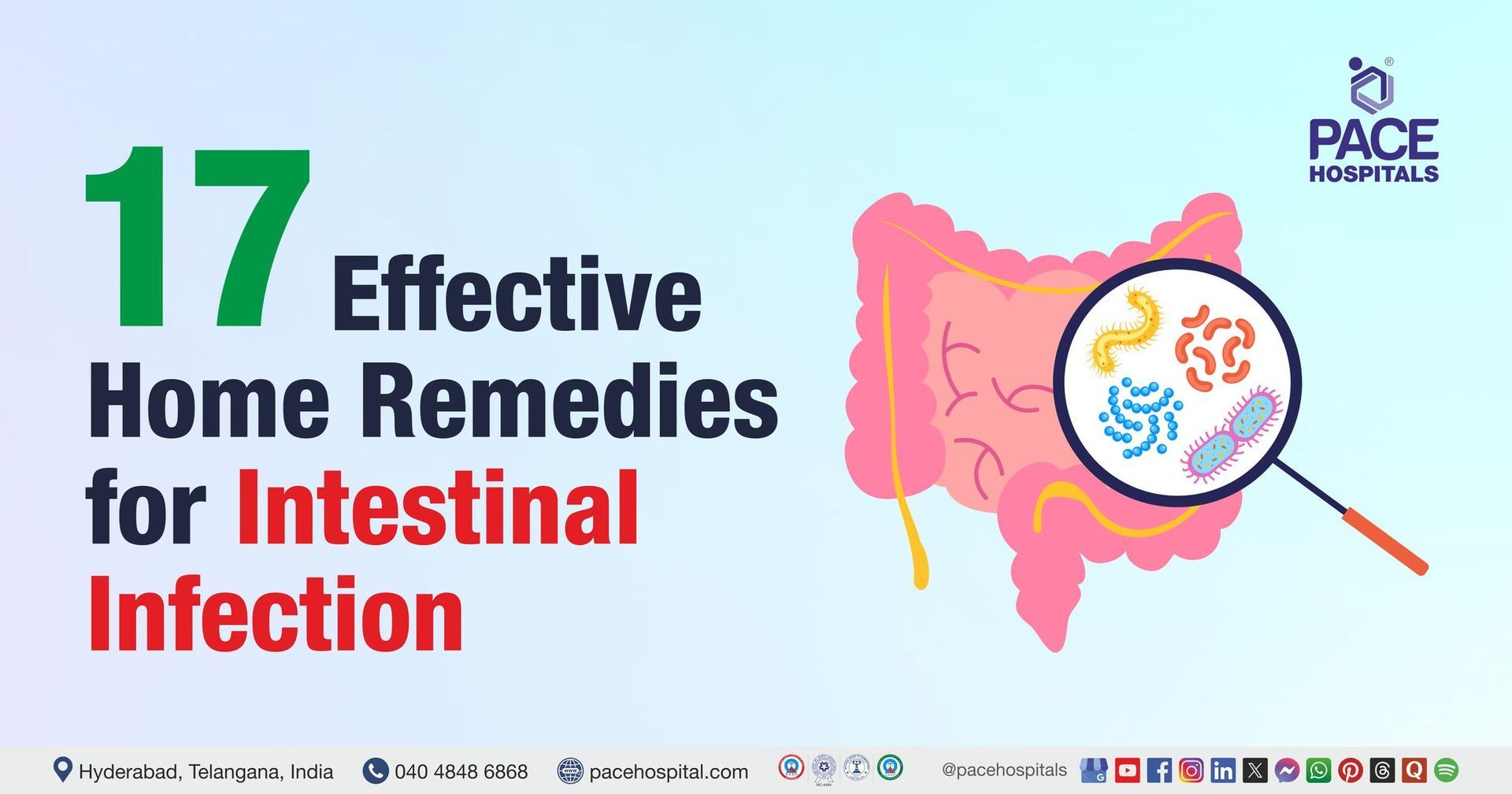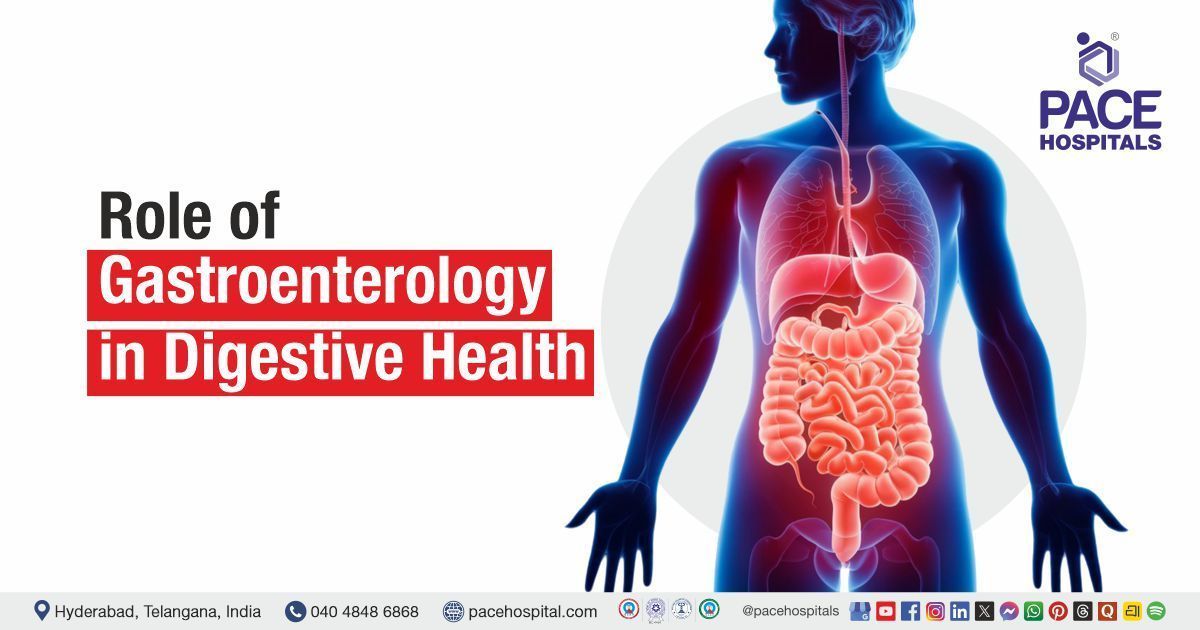17 Natural Home Remedies for Intestinal Infection
PACE Hospitals
Bowel infections are caused by microorganisms ('bugs' or germs) that have infiltrated the gut. The gut (also known as the bowel or intestine) is part of the digestive system.
Bowel infections are sometimes known as gastrointestinal infections or gastroenteritis.
Gastroenteritis can develop due to consuming contaminated water or food. This is often referred to as food poisoning.
Gastroenteritis can also occur from infected persons or contaminated objects like cutlery, taps, toys, or nappies.
Bowel infections can strike anyone at any time. They can cause significant discomfort and inconvenience. They can occasionally escalate to more serious complications.
Natural remedies for Intestinal Infection
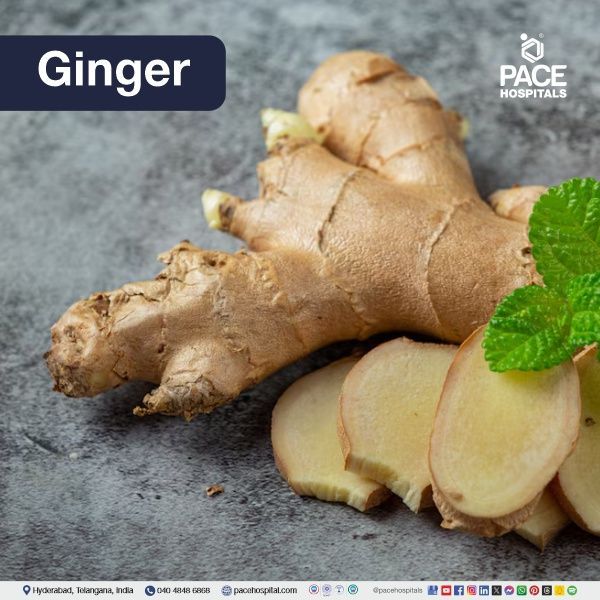
1) Ginger
In addition to its delicious taste, ginger has a number of health benefits that can be relished in a variety of ways.
Ginger is not only delicious. Gingerol, a natural component of ginger root, improves gastrointestinal motility, or the rate at which food exits the stomach and proceeds through the digestive process. Eating ginger promotes efficient digestion, allowing food to pass through the intestines more quickly.
Ginger's antibacterial qualities could make it effective against bacterial and fungal infections.
Laboratory investigations have discovered that it may be beneficial against:
- Staphylococcus aureus (S. aureus) is responsible for a variety of illnesses.
- Escherichia coli (E. coli) is the cause of intestinal illnesses.
- Candida albicans (C. albicans) causes fungal infections in the mouth, vagina, etc.
Eating ginger can help reduce fermentation, constipation, and other causes of bloating and intestinal gas.
For intestinal infections, ginger can be taken as a tea, juice, powder, or as an ingredient in food. Its antibacterial and anti-inflammatory qualities help in reducing inflammation, combating infections, and easing digestion. Restrict consumption to 3–5 grams per day and get medical advice if necessary.
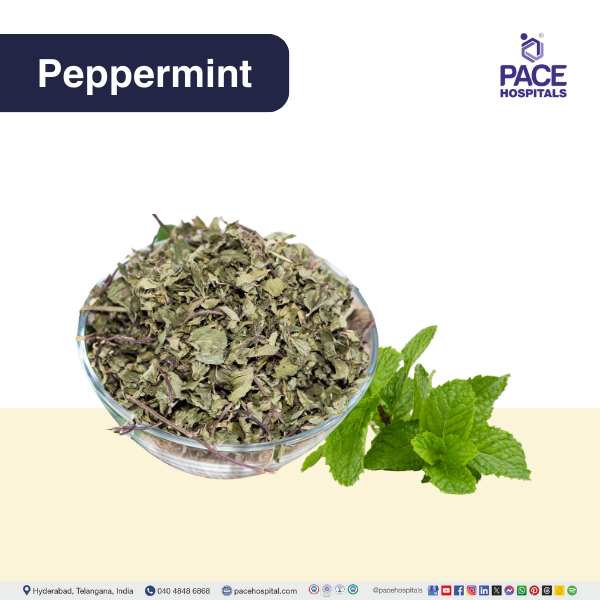
2) Peppermint
Peppermint's primary components, menthol and methyl salicylate, offer antispasmodic properties and soothe the gastrointestinal tract. Some research suggest the use of peppermint for dyspepsia and Irritable bowel syndrome (IBS).
One study indicated that peppermint oil in enteric-coated capsules may alleviate stomach pain in certain children.
For intestinal infections, peppermint can be consumed as tea, essential oil, or as medication. Peppermint tea relieves digestive discomfort, and oil or tablets can help with bloating, cramping, and nausea.
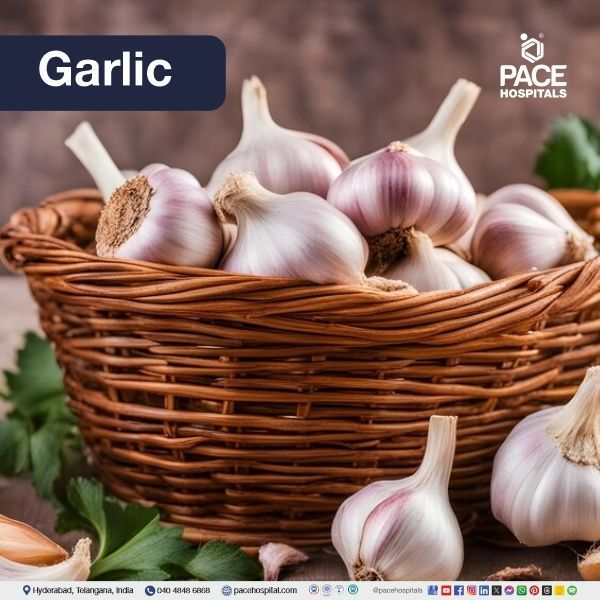
3) Garlic
Garlic, often referred to as a "superfood," has been historically valued for its medicinal benefits. Garlic is a natural antibiotic that works amazingly for intestinal problems. Garlic, composed of strong substances like allicin, has outstanding antibacterial, antifungal, and antiviral effects, making it a great remedy in combating harmful bacteria in the digestive tract.
Garlic, whether consumed raw, or in supplements, or as garlic-infused oil, improves digestive discomfort, reduces inflammation, and promotes gut health. It helps to fight against harmful bacteria and parasites that can cause bloating, diarrhoea, and cramps, making it a popular remedy for aiding digestion and accelerating recovery from intestinal conditions.
Garlic for intestinal infections is usually taken raw, crushed, or as capsules. Eating 1-2 raw garlic bulbs every day can help to fight against bacteria. Garlic oil or supplements may also be used. It contains antibacterial and anti-inflammatory effects that promote gut health.
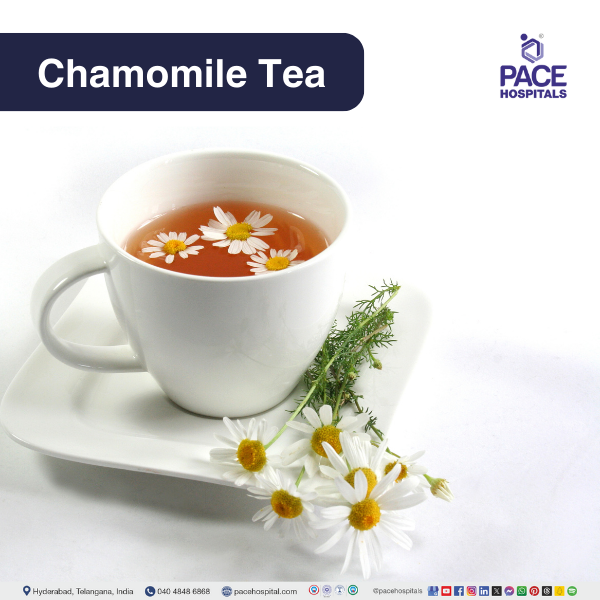
4) Chamomile
Chamomile has traditionally been used for a variety of gastrointestinal ailments, including digestive difficulties, "spasm" or colic, upset stomach, flatulence (gas), ulcers, and gastrointestinal irritation.
According to studies, chamomile suppresses Helicobacter pylori, the bacteria that can cause stomach ulcers. Chamomile is thought to help reduce smooth muscle spasms associated with a variety of gastrointestinal inflammatory illnesses.
Chamomile for intestinal infections is commonly consumed as tea. Soak 1–2 tablespoons of dried chamomile flowers in hot water for 5–10 minutes. Chamomile has anti-inflammatory and relaxing effects, which can help ease stomach discomfort, nausea, and bloating caused by infections.
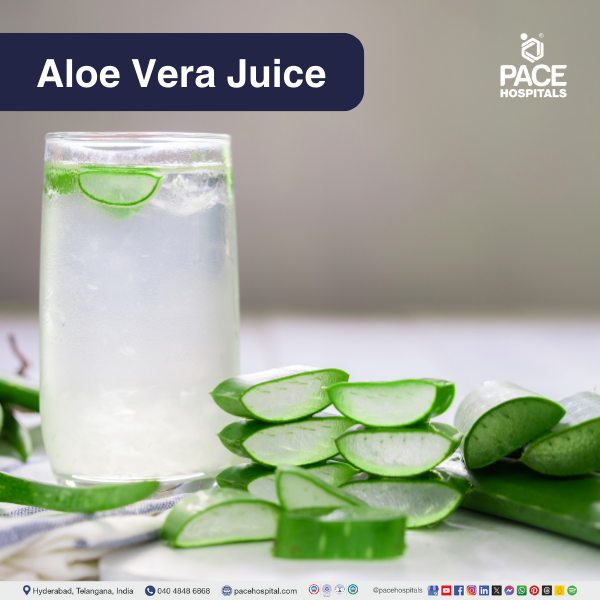
5) Aloe Vera
Aloe vera is a herbal treatment that can be used to treat digestive disorders, such as:
- Irritable bowel syndrome (IBS)
- Acid reflux
- Infections due to norovirus
- Indigestion
Aloe vera for intestinal infections is taken as a fresh gel or juice. Drink 1-2 teaspoons of aloe vera juice every day or combine the gel with water. Aloe vera soothes inflammation, promotes healing, and improves intestinal health.
Irritable bowel syndrome: Aloe vera can relieve symptoms such as constipation and diarrhoea. Some studies indicate that aloe vera is safe and helpful for the short-term treatment of IBS.
Acid reflux: Aloe vera juice can help relieve acid reflux symptoms by reducing inflammation in the digestive tract. Some studies indicate that aloe vera may have a comparable effect on GERD symptoms as certain drugs.
Norovirus: Norovirus is a highly contagious virus that causes stomach and intestinal inflammation, which is also known as acute gastroenteritis. In the gastrointestinal tract. A study reported that use of aloe vera extract can suppress the effects of norovirus on gastrointestinal tract.
Indigestion : Aloe vera can treat indigestion by lowering stomach acid, calming inflammation, and aiding in healing of the gastrointestinal tract.
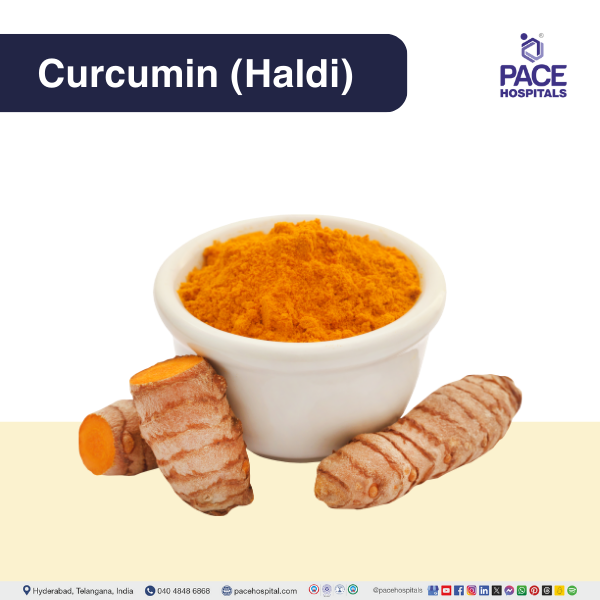
6) Curcumin
Curcumin has been used for ages to treat a variety of conditions. With its wide range of molecular targets, it has demonstrated outstanding potential as a therapeutic agent for numerous cancer types and inflammatory diseases. Because of its enhanced bioavailability in the gastrointestinal system, gastrointestinal disorders such as inflammatory bowel disease (IBD), hepatic fibrosis, and gastrointestinal malignancies are among the most extensively studied diseases indicating curcumin's therapeutic potential.
Curcumin, the active ingredient in turmeric, is taken as a supplement, powder, or tea. Add 1/2 teaspoon turmeric powder to warm water or milk. It possesses anti-inflammatory and antibacterial qualities, which help to relieve and treat intestinal infections.
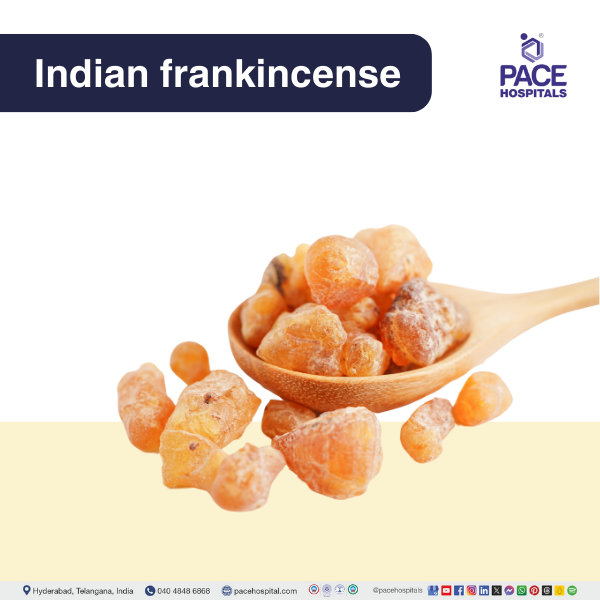
7) Indian frankincense
Indian frankincense, also known as Boswellia serrata, may aid with gastrointestinal diseases such as IBS and ulcerative colitis.
A 2017 study discovered that frankincense mixed with other herbs improved stomach discomfort, bloating, anxiety, and sadness in IBS patients. Another study discovered that taking 250 mg of Boswellia tablets daily for six months helped with IBS symptoms.
This plant is known for its anti-inflammatory properties and has been demonstrated to help manage inflammatory bowel illnesses, which can be associated to infections.
Indian frankincense is taken in capsules or powdered form. Typically, 300-500 mg of Boswellia extract is used once or twice daily. It possesses anti-inflammatory and antibacterial qualities, which assist in alleviating gut inflammation and promote healing from intestinal infections.
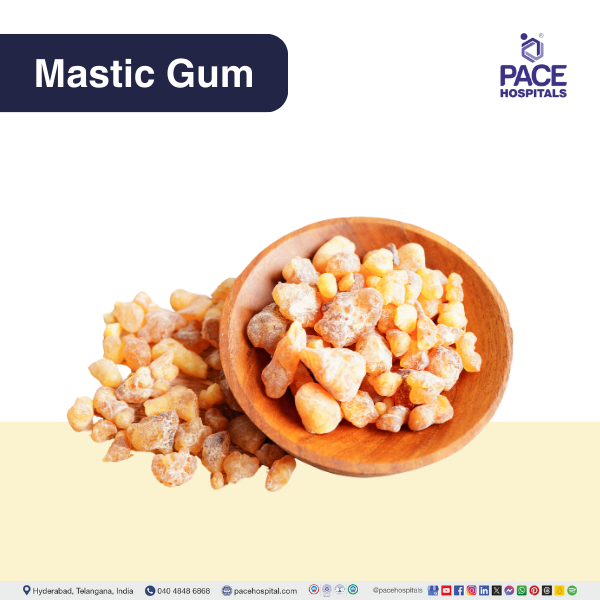
8) Mastic Gum
Mastic gum (Pistacia lentiscus) is a unique resin derived from a Mediterranean tree. For generations, the resin has been utilised to aid digestion, oral health, and liver function. It includes antioxidants, which are thought to support its medicinal benefits.
Mastic gum has been used traditionally for gastrointestinal disorders and shows promise in reducing symptoms associated with intestinal infections.
According to a 2005 article, mastic gum can help reduce stomach discomfort, pain, and inflammation. The antioxidants and anti-inflammatory chemicals included in mastic gum may contribute to its beneficial effect on digestion.
A 2010 study revealed that mastic gum may destroy Helicobacter pylori bacteria. After two weeks of chewing mastic gum, 19 of 52 participants were able to eradicate the infection. Participants who took antibiotics in addition to eating mastic gum had the best success rate. H. pylori is a gastrointestinal bacterium associated with ulcers.
Mastic gum for intestinal infections can be consumed as capsule or chewable form. Usually, 500 mg to 1 gram is consumed daily. It possesses antibacterial and anti-inflammatory qualities that assist to relieve digestive discomfort, reduce inflammation, and successfully treat gut infections.
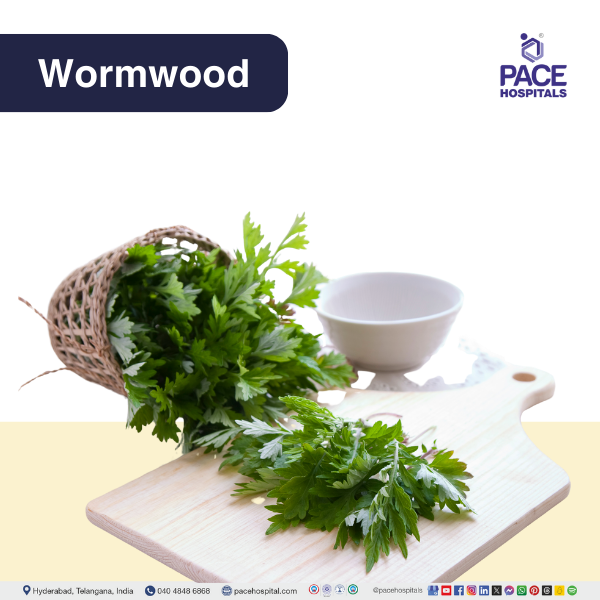
9) Wormwood
Wormwood is effective in treating parasites that cause severe gastrointestinal disease, such as pinworms, roundworms, and tapeworms.
Wormwood includes camphor, which is used in products like Vicks Vapo-Rub to provide strong antibacterial and antifungal properties.
Wormwood is effective against Staphylococcus aureus, a common pathogen that causes skin and soft tissue infections. This includes MRSA, which is a deadly type of infection.
Wormwood's antifungal action may also target common fungus like Candida albicans (which causes yeast infections and oral thrush).
Wormwood has traditionally been used to treat indigestion, flatulence, gastritis, and gallbladder complaints. It is supposed to increase the production of saliva, stomach mucus, and intestinal fluids, which can help lower stomach acids that cause peptic ulcers and acid reflux.
Wormwood also appears to enhance bile output from the gallbladder, which may aid digestion and relieve constipation.
According to a 2020 assessment, wormwood may be useful against Crohn's disease, which is an inflammatory bowel illness. Wormwood, by lowering inflammation and promoting digestive secretions, may lessen the need for steroid medicines to treat gut inflammation and pain.
Wormwood is taken as a tea, tincture, or capsule. Soak 1-2 tablespoons dried wormwood in boiling water for 10 minutes. It contains antibacterial and antiparasitic effects, making it useful for treating intestinal diseases, particularly those caused by parasites.

10) Lemon water
Lemon juice is an age-old treatment for a variety of diseases, including colon cleansing. The citric acid in lemon works well in producing digestive fluids and aiding digestion. It is an effective detox to rid the intestines of accumulated waste and pollutants. Lemon juice, when consumed consistently, can assist to prevent constipation and maintain colon health. It keeps toxins out of the bowels and reduces bloating and gas.
Squeeze half a lemon into warm water and swallow on an empty stomach. It cleanses the digestive tract, balances stomach acid, and aids in detoxification, providing relief from intestinal infections and digestive pain.
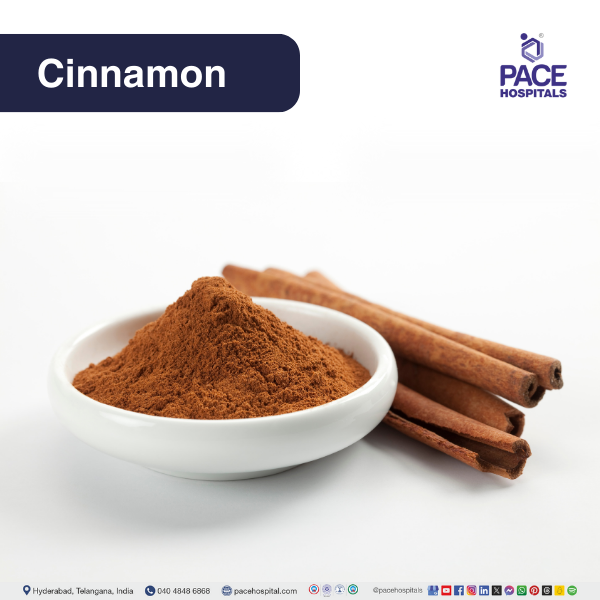
11) Cinnamon
Research studies demonstrated that cinnamon has beneficial effects in treating intestinal infections and other gastrointestinal disorders.
Cinnamon contains many bioactive compounds, including cinnamic acid, cinnamic aldehyde, cinnamic alcohol, coumarin, and eugenol.
Cinnamon has antibacterial properties that may help treat infections. Cinnamon extracts can inhibit the growth of Helicobacter pylori, a type of harmful bacteria that can cause intestinal infections.
Cinnamon can reduce inflammation in the intestines. Cinnamon extract can help with colitis by reducing inflammation and fibrotic symptoms.
Cinnamon can improve the diversity and richness of intestinal microbiota. Cinnamon can also decrease the presence of harmful bacteria in the large intestine.
Cinnamon can increase the expression of genes that help defend against gut bacteria.
Cinnamon for intestinal infections can be consumed as tea or powder. Combine 1/2 teaspoon cinnamon powder with warm water or tea. It has antibacterial and anti-inflammatory properties that aid in the treatment of gut infections, inflammation, and digestive issues.
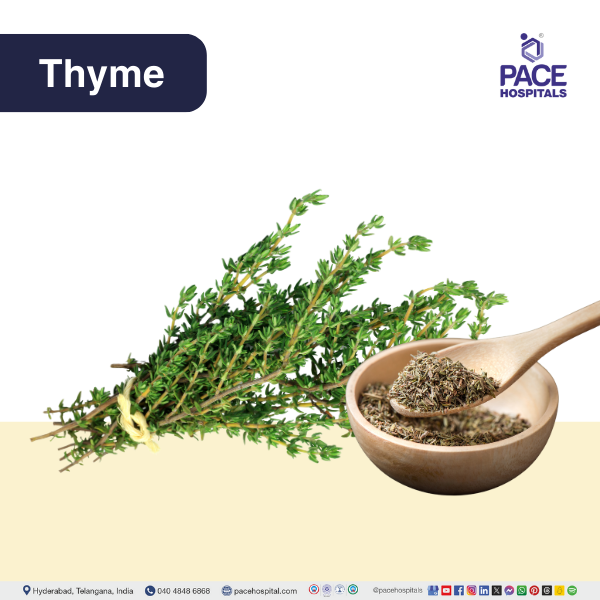
12) Thyme
Thyme oil's microbiological properties can help prevent foodborne bacterial and fungal diseases. It could help protect foods from bacteria like salmonella and staphylococcus aureus.
The plant has been shown to be quite effective in treating a variety of intestinal illnesses and infestations, including hookworms, ascarids, Gram-positive and Gram-negative bacteria, fungus and yeasts, and Candida albicans. The active ingredient, thymol, has been reported to be effective against enterobacteria and cocci bacteria.
Thyme is used to treat intestinal infections as a tea or in capsule form. Soak 1–2 tablespoons dried thyme in boiling water for 5–10 minutes.
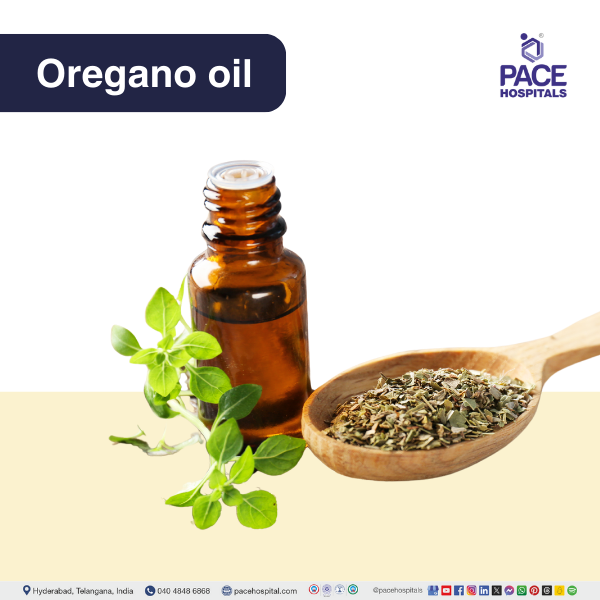
13) Oregano oil
Oregano oil, also known as oil of oregano, is extracted from the oregano plant's leaves and has been used in folk medicine for ages to prevent sickness. Despite its well-known bitter, terrible taste, many people continue to use it to treat infections and the common cold.
Oregano oil includes an ingredient called carvacrol, which has been shown in trials to be effective against the germs Staphylococcus aureus. This bug can contaminate food, particularly meat and dairy products, and is a major source of foodborne illness around the world.
Researchers also discovered that the herbal oil could help treat small intestinal bacterial overgrowth (SIBO), a digestive ailment.
Oregano oil is often used to treat a variety of digestive issues, including stomach pains, bloating, and irritable bowel syndrome. While additional research is needed, doctors have discovered that carvacrol is efficient against the bacteria that cause intestinal distress.
Oregano oil is consumed in its diluted form. Mix 1-2 drops of oregano oil with unsaturated oil (such as olive oil) or water and consume 1-2 times per day. It contains significant antibacterial and antifungal effects, which help to relieve gastrointestinal infections.
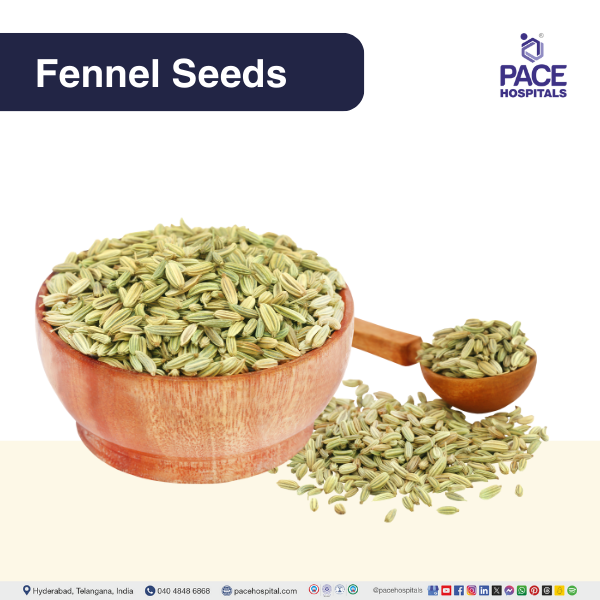
14) Fennel Seeds
Fennel seeds have strong anti-inflammatory effects that can help reduce inflammation in the digestive tract. A study found that fennel seed extract could improve intestinal barrier function by increasing transepithelial electrical resistance (TEER) in colonic cell lines and lowering inflammatory responses associated with diseases such as inflammatory bowel disease (IBD).
Fennel seeds include antibacterial characteristics that can help treat a variety of gastrointestinal diseases. Their essential oils contain chemicals that have been demonstrated to suppress the growth of bacteria that cause gastrointestinal problems, including Escherichia coli and Salmonella. This antibacterial impact can help manage illnesses that cause symptoms such as diarrhoea and stomach pain.
Fennel seeds can be taken directly by chewing 1–2 teaspoons or soaked in hot water to make fennel tea. They have antibacterial and anti-inflammatory qualities, which can assist with bloating, gas, and digestive pain caused by intestinal infections.
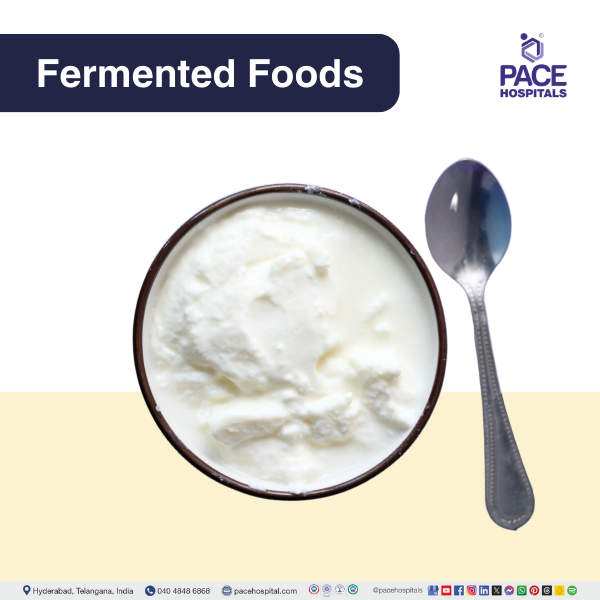
15) Fermented foods
Yoghurt is a popular dairy product produced through bacterial fermentation of milk.
Human studies employing yoghurt have shown promising health benefits for a variety of gastrointestinal problems, including lactose intolerance, constipation, diarrhoeal illnesses, colon cancer, inflammatory bowel disease, Helicobacter pylori infection, and allergies. Patients with any of these diseases may benefit from consuming yoghurt. Yoghurt consumption has been shown to improve gastrointestinal function through impacts on gut microbiota, bowel transit, and the improvement of gastrointestinal innate and adaptive immune responses.
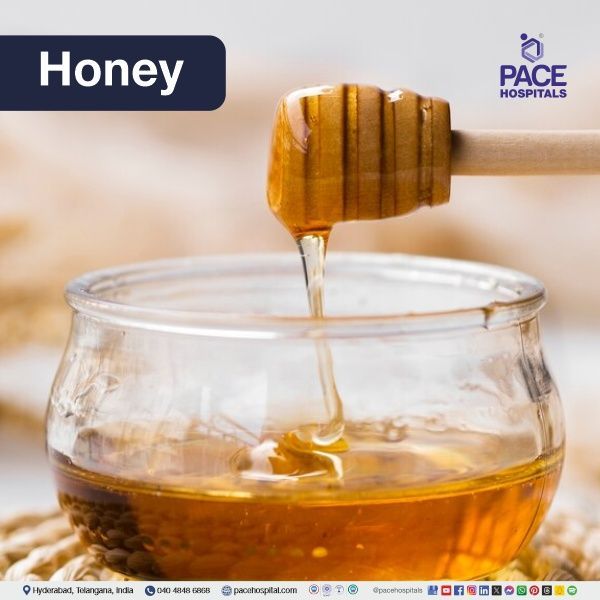
16) Honey
According to studies, honey can reduce the duration of diarrhoea caused by bacterial gastroenteritis. It works well when combined with oral rehydration treatments, helping to reduce the severity and length of diarrhoea in patients. Honey's high sugar content stimulates salt and water absorption in the intestines, similar to glucose in rehydration treatments.
Honey can either consumed directly or mixed with warm water or herbal teas in quantities of 1-2 teaspoons. It possesses antibacterial and anti-inflammatory qualities, which helps to relax the gastrointestinal tract, reduce inflammation, and promote healing of intestinal infections.
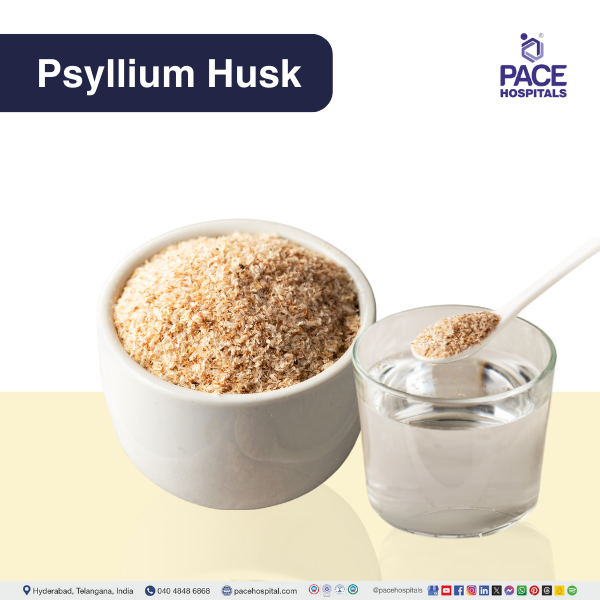
17) Psyllium husk
According to research, psyllium supplementation can significantly alter the composition of gut bacteria. Psyllium has been demonstrated in constipated patients to enhance the population of good bacteria including faecalibacterium and lachnospira, which are linked to better gut health and short-chain fatty acid (SCFA) production. These SCFAs serve an important function in maintaining the gut barrier integrity and influencing immunological responses, potentially lowering the risk of gastrointestinal infections.
Psyllium husk is consumed by combining 1-2 tablespoons in a glass of water or juice and swallowing it right away. It aids digestion, relieves constipation, and promotes gut health by functioning as a fibre supplement, consequently helping in intestinal infection recovery.
Frequently Asked Questions (FAQs) on Intestinal infection
What are the symptoms of intestine infection?
Common symptoms of a gut infection include diarrhoea, nausea, vomiting, crampy stomach pain, fever, and headache. Blood can also be found in some people's faeces (poo), particularly in cases of dysentery. Bacteria and parasites can both cause blood in the faeces.
What is the most common cause of intestinal infection?
Viruses, such as rotavirus, are the most prevalent cause of bowel infections in young children. Rotavirus spreads quickly through contact with contaminated vomit or faeces (poo), and it can cause severe sickness.
How long can an intestine infection last?
Depending on the cause, bowel infection symptoms may develop between 1-3 days of infection and range from minor to severe. Symptoms normally last only for a day or two, but sometimes they might persist up to 14 days.
What are the home remedies for infection in large intestine?
Home remedies that may help to fight against large intestinal infections may include, getting enough hydration, taking a diet rich in Fiber, consuming lemon water with honey, consuming fruit juices, taking probiotic, consuming herbal teas, consuming ginger, consuming fish oil, fasting may be helpful in colon cleansing.
What are the home remedies for bacterial intestinal infection in infants?
The main at-home remedy for a bacterial intestinal infection in infants is to make sure that they are properly hydrated by giving them frequent little amounts of an oral rehydration solution and a bland diet consisting of easily digested foods like bananas, applesauce, and toast. The caretaker of the child should also keep an eye out for any signs of dehydration and seek medical help if symptoms worsen. Other possible supportive measures include ginger tea (for older infants), probiotics (after consulting a
paediatrician), and rest.
Can damaged intestines heal?
Because the gut lining is continuously rebuilding itself, damaged intestines can really heal. Intestinal stem cells generate billions of daughter cells, which evolve over time into the kind that develops and rebuilds the gut lining. Even if the stem cells themselves are damaged, they are replaced by a self-renewing pool within a week.
Are there any dietary changes that can prevent intestinal infections?
Yes, dietary changes that can help prevent intestinal infections include eating fiber-rich whole grains, fruits, and vegetables, incorporating probiotic-rich foods like yoghurt and fermented vegetables, drinking plenty of fluids, and avoiding undercooked meats and contaminated water, which can harbour harmful bacteria; essentially, concentrating on a balanced diet that supports a healthy gut microbiome.
Is honey safe to use as a remedy for intestinal infections in children?
Honey can be considered safe to use as a remedy for intestinal infections in children over the age of one year old because it has antibacterial properties that may help with bacterial diarrhoea; however, it is absolutely not safe to give honey to infants under one year old due to the risk of infant botulism, a serious condition caused by bacteria present in honey that can affect their immature immune system.
How do herbal teas contribute to the management of gastrointestinal infections?
Including herbal teas like peppermint, ginger, chamomile, fennel, and cumin in your diet can provide natural treatment for gastrointestinal problems. These teas not only calm the digestive tract, but they also improve overall gut health by lowering inflammation and supporting improved digestion.
While herbal teas are generally harmless, it is best to contact a health care expert if symptoms continue or worsen.
What role does hydration play in managing intestinal infections with natural remedies?
Maintaining appropriate hydration is critical for treating intestinal infections. It prevents dehydration, aids digestion, lubricates the gastrointestinal system, maintains gut microbiota balance, and improves nutritional absorption. Drinking plenty of fluids and using oral rehydration solutions during bouts of diarrhoea or vomiting are excellent ways to manage these infections.
Can dietary fiber help in the recovery from intestinal infections?
Yes, dietary fibre may aid in the recovery from intestinal infections by encouraging good gut bacteria balance, regulating bowel movements, and lowering inflammation.
Is there a risk of using natural remedies for intestinal infections alongside conventional medications?
While natural therapies can help with intestinal infections, there are considerable risks such as drug interactions, delayed therapeutic effects, etc connected with using them alongside conventional medications. Patients should discuss any herbal supplements they are contemplating with their healthcare practitioners to avoid potential interactions and guarantee safe and successful treatment techniques.
Share on
Request an appointment
Fill in the appointment form or call us instantly to book a confirmed appointment with our super specialist at 04048486868

